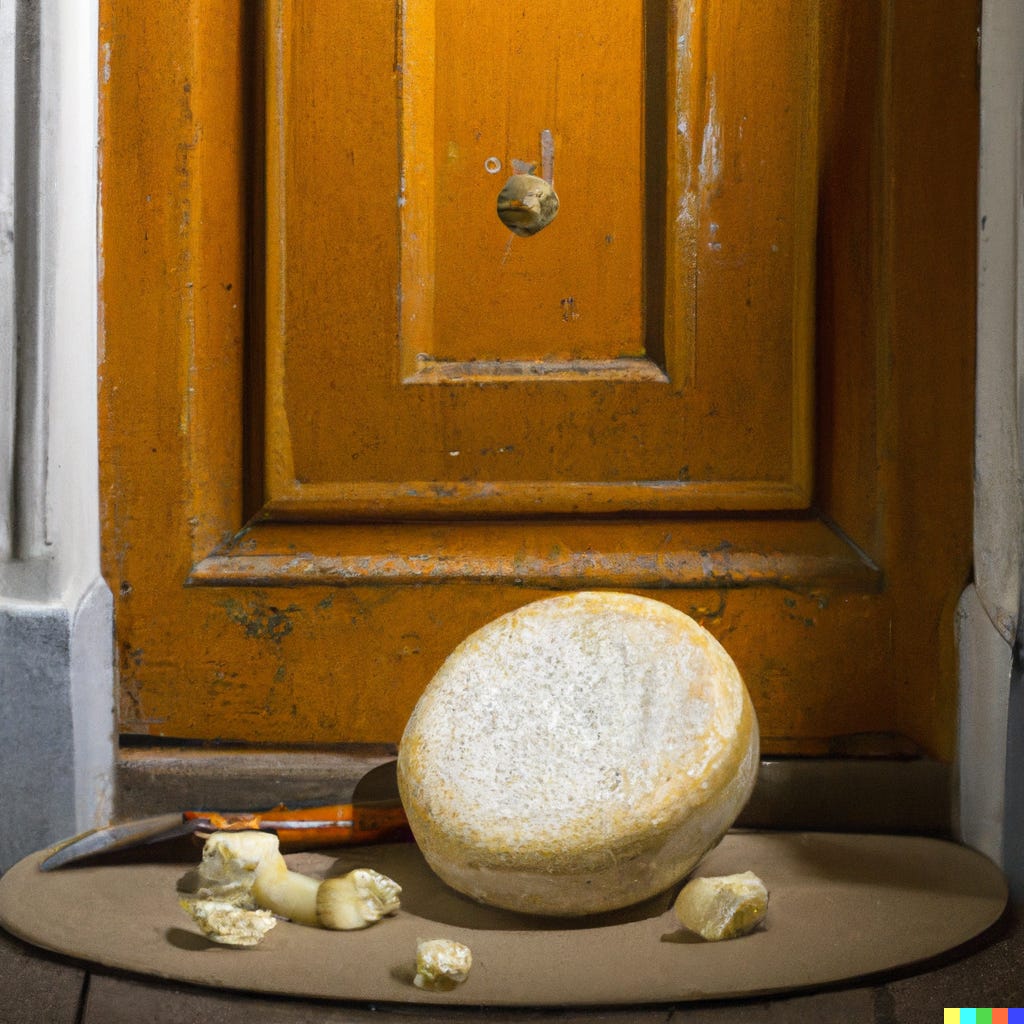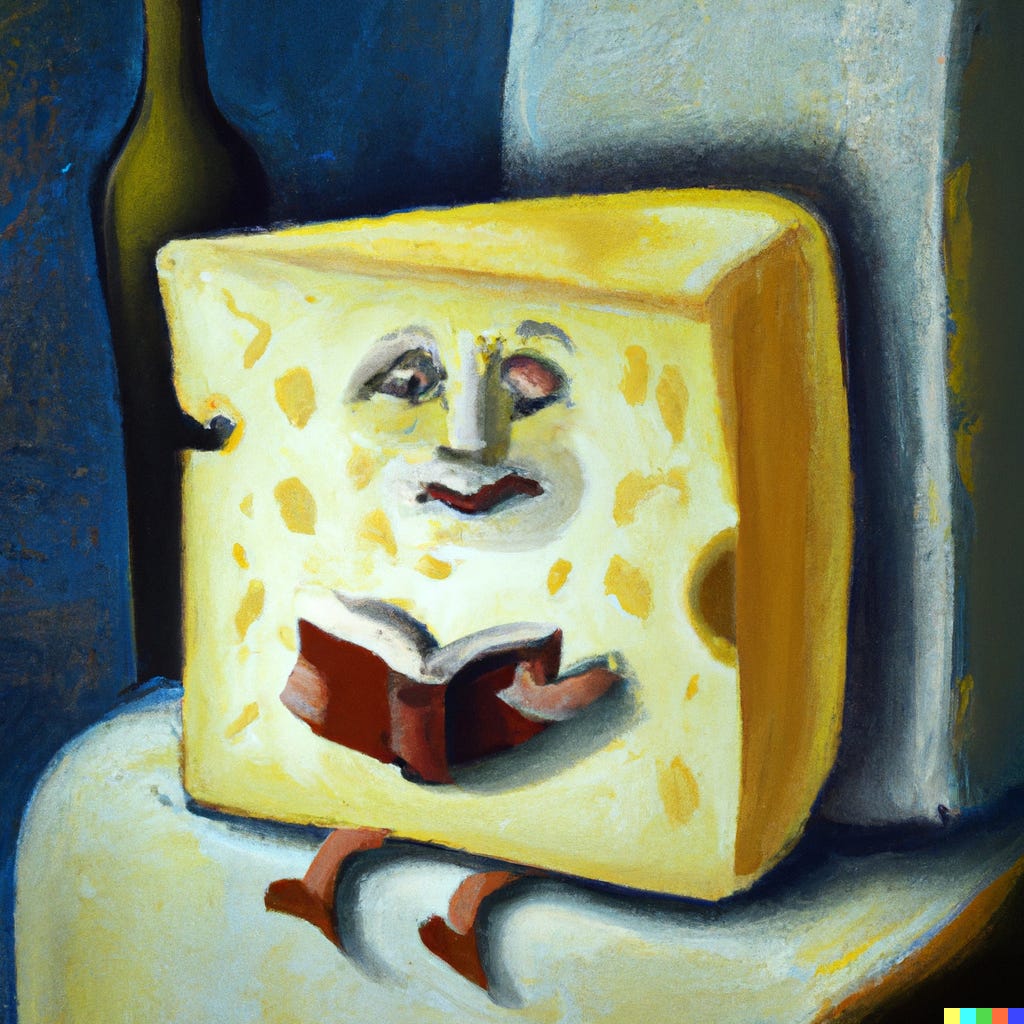Tremendous Trifles, January 11, 2024
T.S. Eliot and C.K. Chesterton! The Official Picture of Tremendous Trifles! Cheese!
The Official Portrait
Since inception, both Tremendous Trifles: The Newsletter and the accompanying blog have had two Patron Saints: G.K. Chesterton and T.S. Eliot.
Chesterton was the first Tremendous Trifler, using it as the title of one of his collections of essays. (If you have never read it, it is amazing, and you can buy it here!) Chesterton had a remarkable ability to take the most mundane things in life and discover in them worlds of wonder and beauty. Take the most insignificant thing you can see right now, and Chesterton could have woven a tapestry from it that would leave you gasping for breath at his audacity and perception. He teaches us that there is nothing so small in this world that it does not somehow reflect God and His works.
Eliot spent his whole life peering into the abyss of eternity and deity. He stood right at the precipice, straining to see just a bit further into the Truth. Everything, literally everything, was wrapped up into our faltering attempts to understand just a bit more about the unknowable and ineffable nature of God and His works. Looking around at the wreck of civilization, the veritable Waste Land, Eliot began trying to weave together the straying strands of civilization to allow us to climb higher and see farther. Beginning with measuring out our lives with coffee spoons, Eliot tried to go where Dante feared to tread. Eliot speaks in groaning too deep for words. There are mysteries to solve and strands of civilization to reweave. Poem by poem.
So the project of this here newsletter has been to join with Chesterton and Eliot in these grand conversations about the best that has been thought and said, measuring out our lives with coffee spoons…and books.
Imagine, then, the joy of Your Humble Narrator at Christmas when one of The Offspring (Lily, the one with massive artistic talent) gave me a gift of a framed picture of the soul of this work.
T.S. Eliot and G.K. Chesterton Having Coffee
It is now the Official Picture of Tremendous Trifles.
Cheese is the Gateway to Truth
You’ll note in the picture that Eliot is petting a cat, which is a wonderful reference to Old Possum’s Book of Practical Cats…a book I spent a lot of time reading to the Offspring when they were young’ins. It's an incredible book of poems, both fun for children and a font of deep speculation on the human condition for adults. The cat is a double metaphor of both philosophical and personal importance.
You will also note the platter of cheese on the table. The personal attachment is there too—enjoying fine cheese on Holiday Occasions is one of the traditions that Your Humble Narrator’s family as a whole (and truth be told, Lily in particular), greatly enjoys. But, as Lily pointed out in giving me the picture, Chesterton has a notable essay on Cheese. In one of those strange ways that Great Minds think alike, Eliot was also fascinated by cheese.
Looking at how they both viewed cheese is, mirabile dictu, a perfect way of seeing the insights they both bring when they ruminate about life.
Chesterton’s essay (which you can read here) begins with remarkably Chestertonian bombast: “My forthcoming work in five volumes, 'The Neglect of Cheese in European Literature,' is a work of such unprecedented and laborious detail that it is doubtful if I shall live to finish it.” Why is cheese so important? As the essay goes on, Chesterton relates a journey through the English countryside, where for four straight days he had four different cheeses in four different counties. Each cheese was a local product. In the “holy act of eating cheese,” Chesterton discovered the genius of each separate place. Notice where you are at all times, and you’ll notice that the world is full of wonder. But, then on the fifth day, Chesterton had cheese in a large city, and it was a dull cheese “cut up into contemptibly small pieces.” People in the cities, in their rush to always be someplace else, have lost the wonder of noting the small things.
Eliot also trumpeted the importance of cheese, but in an Eliotian rather than a Chestertonian manner. In a letter to the Times, he proposed the creation of the “Society for the Preservation of Ancient Cheeses.” He was particularly concerned with preserving the greatness of Stilton and Wensleydale, two fine old English cheeses. To Eliot, the demise of cheese was a perfect example of the decline of Western Civilization. One must scrupulously search through the cheeseboard to separate out those things that need to be discarded and those which point us on toward the Truly Great. Hugh Kenner relates a tale of Eliot having cheese at a restaurant. “The Stilton stood encumbered with a swaddling band, girded about with a cincture, scooped out on top like a crater of the moon. It was placed in front of the Critic.… With the side of his knife blade, he commenced tapping the circumference of the cheese, rotating it, his head cocked in a listening posture. It is not possible to swear that he was listening. He then tapped the inner walls of the crater. He then dug about with the point of his knife amid the fragments contained by the crater. He then said, ‘Rather past its prime. I am afraid I cannot recommend it.’” Fortunately, there was also a cheese on the platter which nobody in the restaurant could identify. Eliot, excited by the Anonymous Cheese, dug in. He was always looking for the next clue to the mysteries of the universe.
Cheese, the trifling, local product on which tremendous insights are found. Cheese, the great product of civilization, which is in decline, but with the aid of a skilled observer can be rebuilt into something looking ever higher. Chesterton and Eliot, drinking coffee, eating cheese, and constantly reminding us of Wonder.
Eliot on Chesterton
Having ruminated on Chesterton, Eliot, and Cheese, I naturally sat back, and behold! my eye fell upon The Complete Prose of T.S. Eliot. “Hmmm,” I mused. “I wonder.” Sure enough. June 20, 1936, in The Tablet. “G.K. Chesterton” by T.S. Eliot. They never met, “but his disappearance, from a world such as that we live in, is one of those which give even to us who did not know the man a sense of personal loss and isolation.”
“His book on Dickens seems to me to be the best essay on that author that has ever been written. Some of his essays can be read again and again; though of his essay-writing as a whole, one can only say that it is remarkable to have maintained such a high average with so large an output. But it is not, I think, for any piece of writing in particular that Chesterton is of importance, but for the place that he occupied, the position that he represented, during the better part of a generation.…Even if Chesterton‘s social and economic ideas appear to be totally without effect, even if they should be demonstrated to be wrong—which would perhaps only mean that men have not the goodwill to carry them out—they were the ideas for his time that were fundamentally Christian and Catholic. He did more, I think, than any man of his time—and was able to do more than anyone else, because of his particular background, development and abilities as a public performer—to maintain the existence of the important minority in the modern world. He leaves behind a permanent claim upon our loyalty, to see that the work that he did in his time has continued in ours.”
Exactly right.
Opportunity Knocks
I am moderating a virtual reading group over at Liberty Fund on T.S. Eliot’s writings. We will be discussing the two essays in his book Christianity and Culture and his essay on education. Please join us! Zero expertise is expected or required; the whole point of Liberty Fund’s virtual reading groups is to get interested people talking about interesting things. The discussion happens in March; you can sign up here.
If you are looking for original artwork for some reason, might I suggest the remarkably talented creator of T.S. Eliot and G.K. Chesterton Having Coffee? Let me know if you are interested, and I’ll see if I can get you a Tremendous Trifles discount!
Book giveaway
A large part of the work of Tremendous Trifles has been getting books, real physical books, into the hands of you, Dear Readers. I really do have more books than fit into my office, so I really am constantly trying to send them out to anyone who will enjoy them. So, if you or someone you know would like any (or all) of the following, sign up below for a chance to get it.
The days are getting brighter, and love is in the air! Or at least some books about romances of assorted varieties are in the mail. The Great Gatsby by F. Scott Fitzgerald, Don Juan by Moliere, and An Ideal Husband by Oscar Wilde. All three are truly Great Books and thoroughly enjoyable to read. If you like settling in with great literature, all three of these are must-reads.
If you enjoy short stories, how about some John Cheever? He was one of the giants of mid-20th-century American letters. Here is how he described his own work: “These stories seem at times to be stories of a long-lost world when the city of New York was still filled with a river light, when you heard the Benny Goodman quartets from a radio in the corner stationary store, and when almost everybody wore a hat. Here is the last of that generation of chain smokers who woke the world in the morning with their coughing, who used to get stoned at cocktail parties and perform obsolete dance steps like ‘the Cleveland Chicken,’ sail for Europe on ships, who were truly nostalgic for love and happiness, and whose gods were as ancient as yours and mine, whoever you are.” If that description doesn’t make you yearn to read these stories, then check to make sure you have a pulse.
Finally, it is always good to chuckle at the absurdities of the modern world. For a long time, Dilbert was a cultural touchstone, exposing the absurdity of modern corporate bureaucracy in panel after panel of a long-running comic strip. Naturally enough, the comics were collected into books. So, if you want to practice smiling at the inane things that happen at work, a collection of old Dilbert comics is just the thing.






